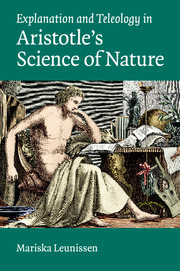Book contents
- Frontmatter
- Contents
- List of figure and tables
- Acknowledgements
- List of abbreviations
- Introduction
- 1 Aristotle's defense of natural teleology: setting the stage for teleological explanations in the Physica
- 2 Aristotle's bio-functional account of the soul: establishing the starting points of teleological explanation in the De Anima
- 3 Introducing biology as a demonstrative science: the theory of teleological explanation in the De Partibus Animalium I
- 4 Explaining parts of animals: the practice of teleological explanation in the De Partibus Animalium II–IV
- 5 Making sense of the heavens: the limits of teleological explanation in the De Caelo
- 6 Aristotle's model of science: formalizing teleological explanations in the Analytica Posteriora
- 7 Conclusion
- Bibliography
- General index
- Index locorum
Introduction
Published online by Cambridge University Press: 07 September 2010
- Frontmatter
- Contents
- List of figure and tables
- Acknowledgements
- List of abbreviations
- Introduction
- 1 Aristotle's defense of natural teleology: setting the stage for teleological explanations in the Physica
- 2 Aristotle's bio-functional account of the soul: establishing the starting points of teleological explanation in the De Anima
- 3 Introducing biology as a demonstrative science: the theory of teleological explanation in the De Partibus Animalium I
- 4 Explaining parts of animals: the practice of teleological explanation in the De Partibus Animalium II–IV
- 5 Making sense of the heavens: the limits of teleological explanation in the De Caelo
- 6 Aristotle's model of science: formalizing teleological explanations in the Analytica Posteriora
- 7 Conclusion
- Bibliography
- General index
- Index locorum
Summary
Why do organisms reproduce? Why do birds have wings? Why do neither snakes nor stars have feet? And why do most of the hoofed life-bearing animals have horns (but not all of them)?
For Aristotle, questions such as these go to the heart of natural philosophy, which is the study of the coming to be and presence of beings that have their own internal principle of change and rest. Throughout his lifetime, Aristotle was deeply committed to investigating and explaining natural phenomena, which is reflected all through the surviving treatises on natural philosophy. Among these, Aristotle's Physica is most fundamental. In this treatise, Aristotle lays out the general theoretical framework for his natural philosophy, defining notions such as nature, motion, causation, place, and time. In the other treatises, Aristotle explores more specific problems related to the study of natural beings, such as coming to be and passing away (in De Generatione et Corruptione), the nature and motion of the elements (in De Generatione et Corruptione and the second part of the De Caelo), the motions and features of the heavenly bodies (in the first part of the De Caelo), atmospheric causes and changes (in the Meteorologica), the notion of soul and its dependence on natural bodies (in De Anima), and finally, the causes of the coming to be and presence of living beings and of their parts and motions (in the biological works).
- Type
- Chapter
- Information
- Publisher: Cambridge University PressPrint publication year: 2010



